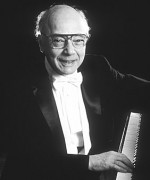Column Name
Title
Pianist Seymour Lipkin was born in Detroit. His grandfather had been a violinist (his custom violin is now on loan for Juilliard students to use), and while Lipkin’s parents weren’t musicians, they were musical, and they noted and encouraged his early interest in listening to music. When Lipkin was 11, he moved to Philadelphia to study at Curtis, boarding with a local family (that Curtis supplied with a piano). A few years later, his sister, Eleanor, joined him, and she later enjoyed a successful performing career in Europe. Lipkin received a Bachelor of Music from Curtis in 1947 and has been on the faculty there since 1969. In addition to Juilliard, where he joined the faculty in 1986, Lipkin has also taught at Manhattan School of Music, New England Conservatory, and Marymount College. He has performed as a soloist with most major American orchestras, recorded extensively, and also had a distinguished conducting career. On October 11, Lipkin will perform an all-Beethoven program at a Daniel Saidenberg Recital honoring his 25 years on the Juilliard faculty.
Body
When did you first know you wanted to be a musician and how did you come to know it?
I first wanted to be musician at age 3. I never made a conscious decision, it was just such a big part of my life—and I never considered anything else. There was never any question about it, or thought that I would be, say, an economist, God forbid. (It’s probably very lucky for society that I didn’t become an economist.)
Who was the teacher or mentor who most inspired you and what did you learn from that person?
Rudolf Serkin was the major influence; I was fortunate to study with him for six years at Curtis. I was there before he came, and then my teacher, David Saperton, left Curtis, and I had to audition all over again, and of course I was scared to death. Mr. Serkin was a very powerful figure. He was very quiet about it—he never asserted it—it just grew out of him. He represented a tremendous conviction of our responsibility to the great composers we represent. Another major influence was Arturo Toscanini, although I never knew him. And another influence was [the oboist and Curtis faculty member] Marcel Tabuteau, who showed us the vital, really central, importance of phrasing and profound methods of its analysis.
What was an influential recording and what was its significance to you?
One early recording I remember, from my teens, was “Wotan’s Farewell” from Die Walküre, sung by Friedrich Schorr; I played it over and over. Another was the “Forging Song” from Siegfried, sung by Lauritz Melchior. I was a “Ring” enthusiast very early, and for years I was the opera accompanist at Curtis.
What are your non-music related interests?
I enjoy reading history, particularly about the development of ideas and attitudes. And one of my favorite hobbies has been bird watching and identification. I go birding in Central Park and in Maine [Lipkin has been artistic director of the Kneisel Hall Chamber Music Festival in Blue Hill, Me., for 25 years]. We’d had bird feeders out because there’s a very active bird population on my street there, but this summer we saw a black bear at the bird feeder, so we had to eliminate the feeder.
What is your favorite thing about New York City?
The enormous variety of influences available if you look: at Juilliard, you open one door and see a ballet; open another and there’s an opera; a third and there’s a Shakespeare play, or lieder, or chamber music, etc. etc. It’s the same thing down the block at Lincoln Center. It’s no good to just go home and practice hour after hour.
What book are you reading right now and what CD are you listening to?
I am reading Presidential Courage by Michael Beschloss, which is about the power of holding to your convictions, even against strong opposition. I am listening to the Saint Matthew Passion conducted by Blanche Moyse with the New England Bach Chorale, who are superb Bach interpreters.
If you weren’t in the career you are in, what would you be doing?
I could not even think about another career.





